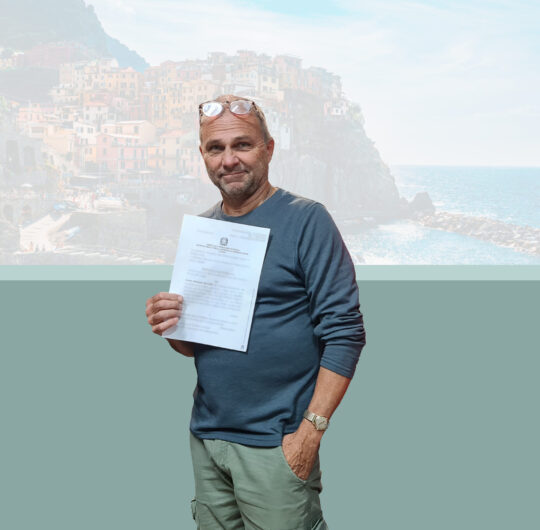We hear all kinds of bad stories about Italian bureaucracy and inefficiency—these stories were a concern for me at the beginning of my citizenship process—so I was quite relieved to discover ICA. Marco, Andrea and their incredible staff of professionals are as good, if not better, than any legal team you can hire in Europe or the United States—I wish they could represent my interests on a larger scale. Their level of correspondence is professional, efficient and always fast. In the three years that my case was in process, whenever I asked a question, or there was a piece of information that needed to be discussed, ICA communicated the information promptly and always with a “next step” strategy as a follow up.
My Italian citizenship process was submitted as a “1948” case and was completed and filed for approval in the middle of the pandemic. It was shocking to receive the news that we would not get our case heard for two years as the court in Rome was delaying all such hearings due to the virus. We filed a petition to accelerate our hearing. Our appeal was quickly approved, and, to my relief, this saved a full year of waiting! My takeaway from this was that ICA moves fast, and their frustration with Italian bureaucracy can be equal to my own at times. It was good to know they were on top of the issue and working hard to creatively overcome a problem. They never missed a step and were not afraid to challenge a court-imposed delay for the benefit of a client.
It’s always a bit scary to deal with entities outside of your home country, but with ICA, I learned not to worry, and I very much felt that I was in good hands. Martina was my specialist and took charge of dealing with every aspect of my citizenship application for over three years. She was stable, humorous and resilient and I can’t imagine how any of this could have been done without her expertise and determination. I have since referred a friend to ICA and he is receiving the same level of great service. Without hesitation, I very much recommend ICA; they function at the highest international levels of competence, and you will not be disappointed. I owe Martina and the entire staff of ICA a big “thank you.”
It has been, overall, an absolute joy to work through this process. All of the stories I’ve come across while working with ICA have been amazing—the family histories, the struggles and the tragedies—so I feel honored to be able to share a bit about how my family story got to this point:
Grandpa Michele made his way to America in the early 1900’s. He was registered as a passenger on more than a few ship crossings out of Europe from 1903 through 1912 and listed his occupation as “lamplighter.” Apparently, multiple trans-Atlantic trips were common for immigrants and Michele’s busy plans for his family showed no exception to this practice. Over time, he felt secure enough to sail to Italy one last time and escort his wife Luisa and their three children back to America to begin their new life. After years of hard work, the family opened up a series of pizza restaurants in St. Louis, Missouri that are still remembered and spoken of today. They were a big, loud, and vibrant immigrant family who enjoyed their fair slice of the American Dream all the way through the 1960’s. By the 1980’s that had faded. Today, they are all gone; I am the last.
Michele obtained his US citizenship around 1914. Grandmother Luisa had no choice in the matter, as his wife, and was naturalized along with him. This indignity was probably of little consequence to brand new Italian-American families at that time, and I doubt it was given much thought back then, but that one small, repressive act provided me with the single, vital lifeline that allowed me to gain my Italian citizenship over one hundred years later. I wish I could thank her. This is Luisa’s story as much as it is mine.
The Italian Constitution of 1948 was pivotal in that, for the first time, women’s rights were being recognized to a significant degree. Italian courts soon ruled that women, such as Luisa, never willingly renounced their Italian citizenship and were not given a voice in their US naturalization. This meant Luisa was still a citizen of Italy and would automatically transmit her un-renounced Italian citizenship to her descendants. Based on all this information, ICA filed a “1948” case on my behalf and my citizenship was approved.
All of this has been a lot for me to take in. It was just a random internet search for nothing in particular that led me to contact ICA in 2019 and now, in 2022, I am an Italian citizen. It is a twist of fortune that I will not take lightly.
I plan on spending most of my time in Italy. As soon as I can get to my family’s ancestral village of Pietraroja I will. For now, I’m deep in Salento buying and fixing up old houses. It is every bit the hair-pulling bundle of difficulty one can imagine but I love bringing back old, historic properties to something near their original state. Everyone in town has an opinion about this, of course, and almost all are willing to help. I’ll try to take it slow and enjoy the ride. I am an Italian.
There is still much work to do, but now that my citizenship process is finished, I look back and realize that my three years of work with ICA were really just the final mile in a 120-year family journey. The journey is now complete, I’ve closed the circle and I’ve reconnected with the land of my ancestors. I hope Grandma Luisa is smiling, somewhere.
Written by James Michael


